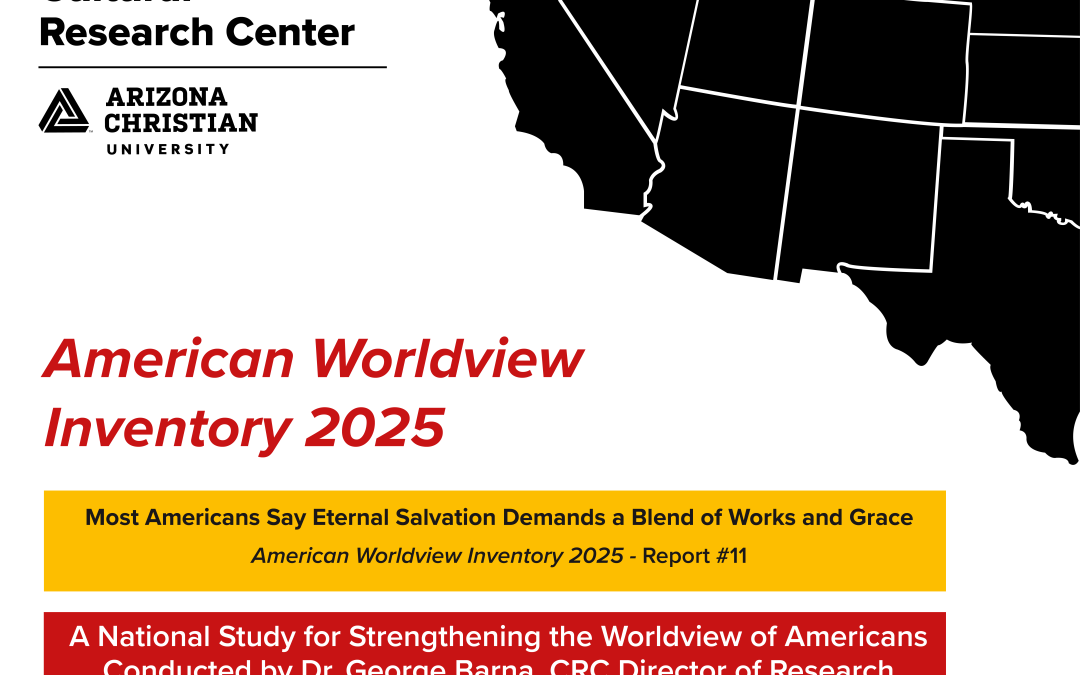(GLENDALE, AZ) — Most Americans—including millions who identify as Christian—hold sharply conflicting beliefs about sin, salvation, and the afterlife. As a result, many believers are “hedging their eternal bets,” adopting a blend of perceived paths to salvation as they seek to secure their eternal destiny.
According to a new national study from the Cultural Research Center at Arizona Christian University, despite near-universal belief in Heaven, many Christians deny that Christ’s sacrifice alone secures salvation. Instead, they trust their eternal destiny to a mix of grace and good works, according to the latest report from the American Worldview Inventory 2025.
Dr. George Barna, Director of Research at the Cultural Research Center at Arizona Christian University, described the results as both revealing and deeply troubling. “There remains a shocking degree of misunderstanding among Christians regarding sin, repentance, forgiveness, and salvation,” Barna said.
“We have a majority of self-described Christians hedging their eternal bets by integrating multiple means of salvation into their personal security plan,” Barna explained. “They say they are relying on Jesus to wash away their sins, but they also expect their good works to gain them points with God, and they retain the possibility of other pathways to eternal peace, just in case.”
The new report highlights several striking patterns that define contemporary American thinking about eternity:
- Only 39% of U.S. adults—and 52% of self-identified Christians—expect to spend eternity in the presence of God.
- Nearly half of all adults (48%) believe they will earn Heaven by being generally good or doing enough good deeds.
- One-third of self-described “born-again” Christians believe good people can earn salvation; one-third also believe in reincarnation.
- 63% of Americans anticipate a peaceful afterlife, but many expect that state without the presence of God.
- Gen Z stands out as the only generation in which fewer than half say embracing Jesus as Savior is “very important” to their eternal destiny.
Together, these findings paint a picture of widespread theological confusion and a lack of understanding about the biblical foundations of salvation.
Multiple Views of Eternity—and Few Aligned with Scripture
The study found significant numbers of American adults embracing non-Christian concepts about life after death: 19% expect some form of reincarnation—either returning to earth as another life form or merging with the universe—and 13% believe they will simply cease to exist. A majority (69%) believe God will be absent from the afterlife. And despite 84% of adults—including 95% of self-professed Christians—affirming the reality of sin, only 3% of all adults believe they will face eternal punishment.
Even more notable are the contradictions among those who appear to most closely align with Christian doctrine. Across three distinct “born-again” segments—self-described, confession-based, and theologically defined—substantial portions believe salvation can be earned through moral effort, personal character, or a mix of spiritual practices.
Across the three distinct “born-again” segments, large numbers embrace beliefs that conflict with Scripture:
- Among self-described born-again adults, 41% believe good people can earn Heaven and 35% believe in reincarnation.
- In the confession-based group (i.e., those who claim they confessed their sins to Jesus and believe that they will spend eternity in the presence of God), a majority believe that “a generally good person” can earn salvation, and half say there are many viable paths to eternal life.
- Even within the theologically defined segment—those most biblically consistent—42% believe good works can secure Heaven and 38% say repentance requires only admitting sin, not changing behavior.
These patterns show that substantial portions of each group rely on moral effort, personal character, or blended spiritual practices as part of their salvation framework.
A Broader Pattern of Biblical Illiteracy
The report concludes that Americans’ views on eternity reflect a larger trend of biblical illiteracy. Most adults collect fragments of religious teaching rather than forming a coherent, biblically grounded worldview informed by the study and understanding of scripture. This patchwork approach leads many to adopt beliefs that directly contradict the Bible—especially on core issues such as sin, repentance, forgiveness, and eternal destiny.
As Barna explained, “The presence of unbiblical beliefs in the minds of most Christian-leaning Americans reminds us that most people are information collectors rather than biblically consistent followers of Christ.”
“Americans are more determined to be comfortable than biblically right. That preference will produce profound eternal effects for each of us,” he said.
The research findings are part of the American Worldview Inventory 2025: Report #11: “Most Americans Say Eternal Salvation Demands a Blend of Works and Grace.” The full report, along with earlier reports in the AWVI 2025 series, is available here.

